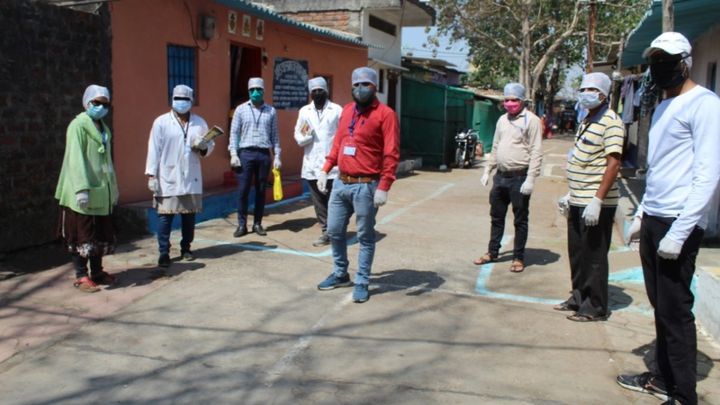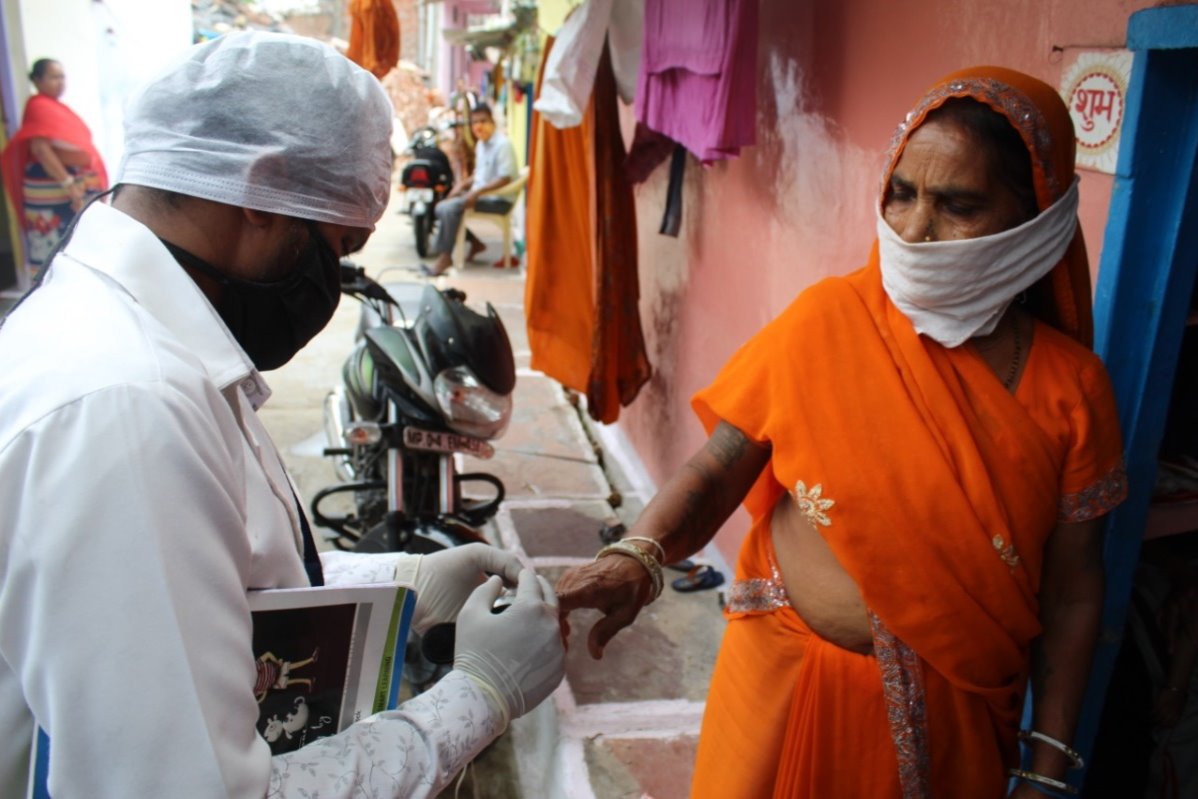
Bhopal's Community Shield - Covid-19 Response
Help gravely vulnerable Bhopal survivors protect themselves from COVID-19
The 1984 gas disaster in Bhopal, India left behind what may currently be the most at-risk population on earth.
On a freezing December night a vast cloud of poison gas leaked without warning from a Union Carbide pesticides factory. In dense settlements south of the plant people woke coughing, choking, their throats and eyes burning. The gas seared delicate tissues, triggering excess fluids that inundated the lungs. Light came to city streets full of scenes from an apocalypse. Bodies lay in heaps, limbs twisted and faces contorted in agony.
The gas was so toxic it scrambled chromosomes, ravaged internal organs, and dissolved lung tissue. It has left over half a million survivors at least five times more vulnerable to the SARS-COV2 virus.
The most severely gas-affected live in some of the planet’s poorest communities. Characterised by cramped, makeshift housing squeezed within narrow, overcrowded alleys, entire families often inhabit single rooms. There is next-to-no access to clean running water, and most residents rely on meagre income from daily-wage labouring – for those healthy enough to work – for survival.
Here, the novel coronavirus has the potential to race through uncontrollably, like wildfire through a parched forest.

Raising a #CommunityShield
On the day of Bhopal’s first Covid-19 death some of the poorest people on earth, lacking adequate protective equipment, testing kits, financial or other resources agreed a demanding and dangerous plan of action designed to monitor and suppress the spread of the virus within their own communities.
In the areas in which our teams are operating, weeks of shoe-leather and shoestring work, linking scores of volunteers with our experienced community health team has so far limited COVID-19 to only three positive cases, and no deaths.
Another invisible killer
The pandemic is engulfing India, now the 3rd worst affected country in the world. Daily cases are rising at a staggering rate, and fears are being realised. ‘More than three-quarters of coronavirus fatalities in Bhopal’ the Telegraph reported on June 24th ‘were exposed to the Union Carbide chemical leak in 1984.’
Our Community Shield has successfully protected 15 of the city’s most vulnerable communities. Now our work is expanding into neighbourhoods in which tens of thousands more gravely at-risk people live. Families here are already grieving for loved ones taken by COVID-19. Our Health Workers are rallying 180 local volunteers to educate, monitor, protect and get treatment for those in urgent danger.

What we need
Community Health teams are an essential part of the primary care program we’ve been delivering for decades through our two clinics, Sambhavna and Chingari. Many of our staff are survivors themselves. Our coronavirus program has already safeguarded thousands of vulnerable people at a cost of pennies per person — but this could change in a breath. Here’s how you could help:
£2.50 – pays a Community Health Worker’s expenses for a month
£200 – pays a Community Health Worker’s salary for a month
£1,200 – pays a Community Health Worker’s Salary for 6 months
£7,200 – pays a doctor’s salary for an entire year
£9,720 – pays for our team of 8 Community Health professionals for 6 months
£11,125 – runs the Chingari Children’s Rehabilitation Centre for one month
£26,922 – runs the Sambhavna Trust Clinic for one month

From Bhopal, with love
“The happiness of selfless service is more than other happiness,” says community volunteer Raïsa. “In each other we find strength and joy of friendship. Yes, we’re poor, but by working together we achieve unimaginable things.”
Extraordinary, isn’t it, that in this cynical age, someone can say that, and mean every word of it?
A free booklet is at www.bhopal.org/covid , and is offered with thanks to our friends in Britain and elsewhere in the hope that it may be useful.

The 1984 gas disaster in Bhopal, India left behind what may currently be the most at-risk population on earth.
On a freezing December night a vast cloud of poison gas leaked without warning from a Union Carbide pesticides factory. In dense settlements south of the plant people woke coughing, choking, their throats and eyes burning. The gas seared delicate tissues, triggering excess fluids that inundated the lungs. Light came to city streets full of scenes from an apocalypse. Bodies lay in heaps, limbs twisted and faces contorted in agony.
The gas was so toxic it scrambled chromosomes, ravaged internal organs, and dissolved lung tissue. It has left over half a million survivors at least five times more vulnerable to the SARS-COV2 virus.
The most severely gas-affected live in some of the planet’s poorest communities. Characterised by cramped, makeshift housing squeezed within narrow, overcrowded alleys, entire families often inhabit single rooms. There is next-to-no access to clean running water, and most residents rely on meagre income from daily-wage labouring – for those healthy enough to work – for survival.
Here, the novel coronavirus has the potential to race through uncontrollably, like wildfire through a parched forest.

Raising a #CommunityShield
On the day of Bhopal’s first Covid-19 death some of the poorest people on earth, lacking adequate protective equipment, testing kits, financial or other resources agreed a demanding and dangerous plan of action designed to monitor and suppress the spread of the virus within their own communities.
In the areas in which our teams are operating, weeks of shoe-leather and shoestring work, linking scores of volunteers with our experienced community health team has so far limited COVID-19 to only three positive cases, and no deaths.
Another invisible killer
The pandemic is engulfing India, now the 3rd worst affected country in the world. Daily cases are rising at a staggering rate, and fears are being realised. ‘More than three-quarters of coronavirus fatalities in Bhopal’ the Telegraph reported on June 24th ‘were exposed to the Union Carbide chemical leak in 1984.’
Our Community Shield has successfully protected 15 of the city’s most vulnerable communities. Now our work is expanding into neighbourhoods in which tens of thousands more gravely at-risk people live. Families here are already grieving for loved ones taken by COVID-19. Our Health Workers are rallying 180 local volunteers to educate, monitor, protect and get treatment for those in urgent danger.

What we need
Community Health teams are an essential part of the primary care program we’ve been delivering for decades through our two clinics, Sambhavna and Chingari. Many of our staff are survivors themselves. Our coronavirus program has already safeguarded thousands of vulnerable people at a cost of pennies per person — but this could change in a breath. Here’s how you could help:
£2.50 – pays a Community Health Worker’s expenses for a month
£200 – pays a Community Health Worker’s salary for a month
£1,200 – pays a Community Health Worker’s Salary for 6 months
£7,200 – pays a doctor’s salary for an entire year
£9,720 – pays for our team of 8 Community Health professionals for 6 months
£11,125 – runs the Chingari Children’s Rehabilitation Centre for one month
£26,922 – runs the Sambhavna Trust Clinic for one month

From Bhopal, with love
“The happiness of selfless service is more than other happiness,” says community volunteer Raïsa. “In each other we find strength and joy of friendship. Yes, we’re poor, but by working together we achieve unimaginable things.”
Extraordinary, isn’t it, that in this cynical age, someone can say that, and mean every word of it?
A free booklet is at www.bhopal.org/covid , and is offered with thanks to our friends in Britain and elsewhere in the hope that it may be useful.

Organizer
Tim Edwards
Organizer
The Bhopal Medical Appeal
Beneficiary